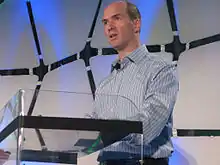Ben Horowitz
Benjamin Abraham Horowitz (born June 13, 1966) is an American businessman, investor, blogger, and author. He is a technology entrepreneur and co-founder along with Marc Andreessen of the venture capital firm Andreessen Horowitz. He previously co-founded and served as president and chief executive officer of the enterprise software company Opsware, which Hewlett-Packard acquired in 2007. Horowitz is the author of The Hard Thing About Hard Things: Building a Business When There Are No Easy Answers, a book about startups,[1][2] and What You Do Is Who You Are: How to Create Your Business Culture.[3]
Ben Horowitz | |
|---|---|
 Horowitz at the TechCrunch Disrupt conference on May 24, 2010 | |
| Born | Benjamin Abraham Horowitz June 13, 1966 London, England |
| Nationality | American |
| Alma mater | Columbia University University of California, Los Angeles |
| Occupation | Co-founder of Opsware and Andreessen Horowitz |
| Spouse(s) | Felicia Wiley (m. 1988) |
| Parent(s) |
|
Early life and education
Horowitz was born Benjamin Abraham Horowitz[4] in London, England and raised in Berkeley, California, the son of Elissa Krauthamer and conservative writer and policy advocate David Horowitz. Horowitz's great-grandparents were Jewish immigrants from the Russian Empire who arrived in the U.S. in the mid-19th and early 20th centuries.[5]
Horowitz earned a BA in Computer Science from Columbia University in 1988 and an MS in Computer Science from UCLA in 1990.[6][7]
Career
Horowitz began his career as an engineer at Silicon Graphics in 1990.[6] In 1995, Horowitz joined Marc Andreessen at Netscape as a product manager.[8] From 1997 to 1998, Horowitz was vice president for the Directory and Security Product Line at Netscape.[6] After Netscape was acquired by AOL in 1998, Horowitz served as Vice President of AOL's eCommerce Division.[9]
In September 1999, Horowitz cofounded Loudcloud with Andreessen, Tim Howes, and In Sik Rhee.[10] Loudcloud offered infrastructure and application hosting services to enterprise and Internet customers such as Ford Motor Company, Nike, Inc., Gannett Company, News Corporation, the United States Army and other large organizations. Horowitz took Loudcloud public on March 9, 2001.[11]
In June 2002, Horowitz began a transformation of Loudcloud into Opsware, an enterprise software company.[12] He took the first step by selling Loudcloud's core managed services business to Electronic Data Systems for $63.5 million in cash.[13] This transaction transferred 100% of Loudcloud's revenue to EDS while the company was publicly traded on NASDAQ. Beginning with EDS as its first enterprise software customer, Horowitz grew Opsware to hundreds of enterprise customers, over $100 million in annual revenue, and 550 employees. In July 2007, Horowitz sold Opsware to Hewlett-Packard for $1.6 billion in cash.[14]
Horowitz was Loudcloud's and Opsware's President and Chief Executive Officer for the entire history of the company. Along the way, shares of Opsware IPO'ed at $6, sank to $0.35 per share at its nadir and traded at $14.25 a share at the time of its sale to HP.[10]
Following the sale of Opsware to Hewlett-Packard, Horowitz then spent one year at Hewlett-Packard as Vice President and General Manager in HP Software[15] with responsibility for 3,000 employees and $2.8 billion in annual revenue.
Andreessen Horowitz
On July 6, 2009, Horowitz and Andreessen launched Andreessen Horowitz,[16] to invest in and advise both early-stage startups and more established growth companies in high technology. Andreessen Horowitz began with an initial capitalization of $300 million[17] and within three years had $2.7 billion under management across three funds.[18]
Personal life
Horowitz lives in Atherton, California with his wife, Felicia Wiley Horowitz.[19][20] They married in 1988 and have three children.[21]
References
- Swisher, Kara (January 14, 2014). "Ben Horowitz Book, "The Hard Thing About Hard Things," Debuts in March". Re/Code. Retrieved February 18, 2014.
- David Goldman (March 12, 2014). "In Horowitz's Silicon Valley Tell-All, a Woman's Place Is Strictly Hypothetical". Bloomberg Businessweek. Archived from the original on March 14, 2014. Retrieved August 21, 2018.
- "What You Do Is Who You Are". Andreessen Horowitz. September 26, 2019. Retrieved January 23, 2020.
- "Scholarship funds" (PDF). Columbia College Bulletin 2014–2015. Columbia University. 2014. p. 59. Retrieved February 4, 2017.
- Horowitz, David (1997), Radical Son: A Generational Odyssey, New York: Simon & Schuster, pp. 7–12, ISBN 1439135193
- "Executive Profile: Benjamin A. Horowitz". Bloomberg LLP. Retrieved February 4, 2017.
- "The Hard Thing About Hard Things". Columbia College Today. Fall 2014. Retrieved January 3, 2021.
- Horowitz, Ben (Fall 2014). "The Hard Thing About Hard Things". Columbia College Today. Columbia University. Retrieved February 4, 2017.
- Kidder, David (2013). The Startup Playbook: Secrets of the Fastest-Growing Startups from Their Founding Entrepreneurs. San Francisco: Chronicle Books. p. 185. ISBN 978-1452105048.
- "Technology News". CNET.
- Wright, Rob (September 13, 2002). "Goodbye Loudcloud, Hello Opsware". CRN. Retrieved November 6, 2020.
- "EDS to Acquire Loudcloud Hosting Business". archive.is. January 20, 2013. Archived from the original on January 20, 2013.
- "HP News, Newsroom, Videos & Podcasts – HP® Official Site". hp.com.
- "HP executive profile of Ben Horowitz" (PDF).
- Maney, Kevin. "Marc Andreessen puts his money where his mouth is". CNNMoney. Retrieved August 2, 2012.
- Menn, Joseph. "Andreessen expands venture capital business". Financial Services. Retrieved August 2, 2012.
- Popper, Ben (January 31, 2012). "Andreessen-Horowitz raises $1.5B for third fund in three years". VentureBeat. Retrieved August 2, 2012.
- Helft, Miguel (February 27, 2014). "Silicon Valley's stealth power". Fortune. Retrieved August 20, 2018.
- Le, Anh-Minh (November 2016). "The Giving Kind". Silicon Valley. Modern Luxury. Retrieved August 20, 2018.
- Streitfeld, David (July 22, 2017). "One Family, Many Revolutions: From Black Panthers, to Silicon Valley, to Trump". The New York Times. Retrieved October 27, 2019.